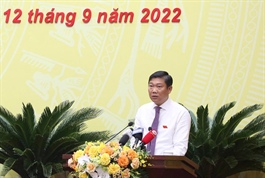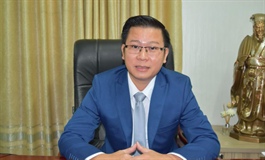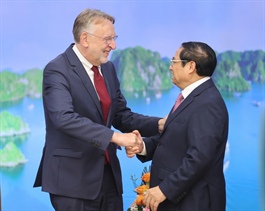Vietnam to overcome difficulties for economic recovery: PM
Vietnam to overcome difficulties for economic recovery: PM
If all goes uneventfully, Vietnam’s GDP growth in the third quarter may hit over 7%.
Vietnam would not stand still but stay active in finding ways for economic recovery amid global volatilities, said Prime Minister Pham Minh Chinh at a conference discussing measures to ensure macroeconomic stability and contain inflation held on September 12.
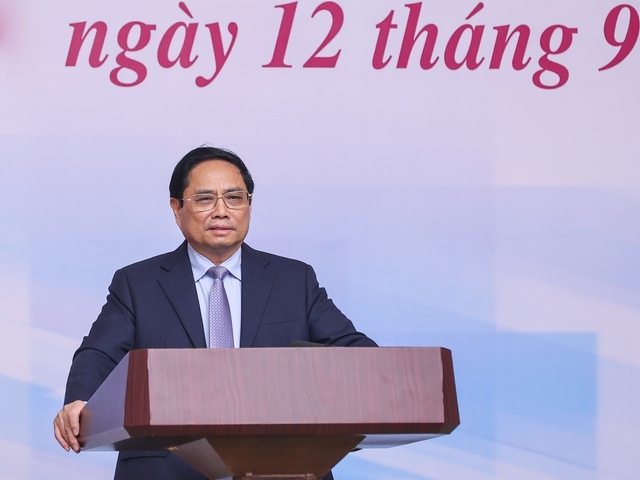
Prime Minister Pham Minh Chinh at the meeting. Source: VGP |
According to Chinh, the global geopolitical situation over the past month remained complicated, with no end in sight to the ongoing conflict between Russia and Ukraine.
“These factors would have both short- and long-term impacts on the global economy, including Vietnam’s,” Chinh said.
Amid this difficult situation, Chinh expected the country to continue prioritizing macroeconomic stability for long-term development.
The prime minister also noted at present, Vietnam has been able to keep positive economic performance, especially with inflation under control and stable capital/monetary markets.
A report from the Ministry of Planning and Investment echoed the view by pointing out a 19% increase in budget revenue during the first eight months of 2022, or 86% of the year’s estimate; or trade turnover of nearly $500 billion, up 15.5%.
“If all goes uneventfully, Vietnam’s GDP growth in the third quarter may hit over 7%,” MPI minister Nguyen Chi Dung said.
“This would help Vietnam’s economic growth to exceed the target of 6-6.5% for this year,” he said.
International organizations have also given positive assessments of Vietnam’s outlook, such as the World Bank or IMF which raised their respective forecast for the country’s GDP growth, and Moody’s which revised Vietnam’s sovereign rating from Ba3 to Ba2, with a stable outlook.
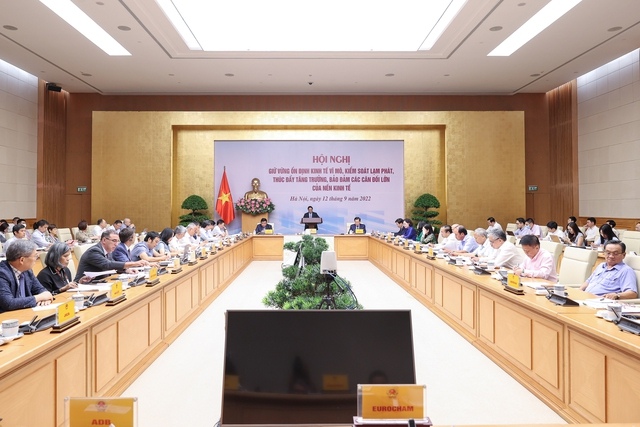
Overview of the meeting. |
Resident Representative of IMF in Vietnam Francois Painchaud suggested Vietnam’s economy is on track for recovery, highlighting stability in the exchange rate and inflation under control.
Painchaud highlighted the efforts of the State Bank of Vietnam (SBV) in keeping the macro-economic stability, and added Vietnam remains the only country in Southeast Asia with IMF’s higher economic forecast,
Sharing Paunchaud’s view, Chief Economist at World Bank Vietnam Andrea Coppola expected Vietnam to record strong economic performance in the third quarter, thanks to the high growth of the industrial sector.
Coppola, however, warned Vietnam to stay cautious about inflationary pressure and called for the Government to maneuver fiscal policies flexibly to ensure effective public investment, keeping national financial security intact and addressing bad debts.
In the long term, the World Bank’s representative urged the country to put greater efforts into administrative reform, saying this would lay the foundation for growth and contribute to economic resilience.
On these issues, Minister Dung added Vietnam as a lower-middle-income country is facing major challenges in keeping a rapid and sustainable economic growth rate, and in avoiding falling into the middle-income trap.
Dung also stressed the necessity for Vietnam to continue investing in infrastructure development; improving efficiency in urban management; shifting the growth model to ones based on science, technologies, and innovation; and promoting the supporting industries.
“Vietnam should grasp any opportunity possible to push for economic recovery and maintain growth engines in the long term,” Dung said while saying adaptable monetary and fiscal policies are required for Vietnam to contain inflation and support growth.





